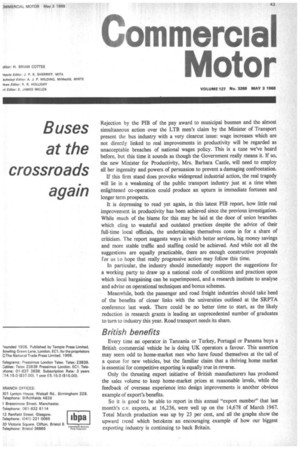Commercial Motor
Page 45

If you've noticed an error in this article please click here to report it so we can fix it.
VOLUME 127 No. 3268 MAY 3 1968
Rejection by the PIB of the pay award to municipal busmen and the almost simultaneous action over the LTB men's claim by the Minister of Transport present the bus industry with a very clearcut issue: wage increases which are not directly linked to real improvements in productivity will be regarded as unacceptable breaches of national wages policy. This is a tune we've heard before, but this time it sounds as though the Government really means it. If so, the new Minister for Productivity, Mrs. Barbara Castle, will need to employ all her ingenuity and powers of persuasion to prevent a damaging confrontation.
If this firm stand does provoke widespread industrial action, the real tragedy will lie in a weakening of the public transport industry just at a time when enlightened co-operation could produce an upturn in immediate fortunes and longer term prospects.
It is depressing to read yet again, in this latest PIB report, how little real improvement in productivity has been achieved since the previous investigation. While much of the blame for this may be laid at the door of union branches which cling to wasteful and outdated practices despite the advice of their full-time local officials, the undertakings themselves come in for a share of criticism. The report suggests ways in which better services, big money savings and more stable traffic and stalling could be achieved. And while not all the suggestions are equally practicable, there are enough constructive proposals for us to hope that really progressive action may follow this time.
In particular, the industry should immediately support the suggestions for a working party to draw up a national code of conditions and practices upon which local bargaining can be superimposed, and a research institute to analyse and advise on operational techniques and bonus schemes.
Meanwhile, both the passenger and road freight industries should take heed of the benefits of closer links with the universities outlined at the SRPTA conference last week. There could be no better time to start, as the likely reduction in research grants is leading an unprecedented number of graduates to turn to industry this year. Road transport needs its share.
British benefits
Every time an operator in Tanzania or Turkey, Portugal or Panama buys a British commercial vehicle he is doing UK operators a favour. This assertion may seem odd to home-market men who have found themselves at the tail of a queue for new vehicles, but the familiar claim that a thriving home market is essential for competitive exporting is equally true in reverse.
Only the thrusting export initiative of British manufacturers has produced the sales volume to keep home-market prices at reasonable levels, 'while the feedback of overseas experience into design improvements is another obvious example of export's benefits.
So it is good to be able to report in this annual "export number" that last month's c.v. exports, at 16,236, were well up on the 14,678 of March 1967. Total March production was up by 23 per cent, and all the graphs show the upward trend which betokens an encouraging example of how our biggest exporting industry is continuing to back Britain.




































































































































































































































